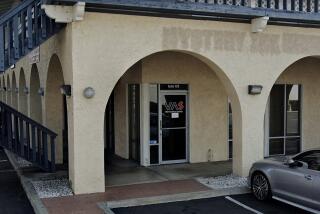Financiers Sued by Angry Investors
- Share via
VENTURA — For nearly three decades, Helen Schlaepfer worked at an Oxnard bank to save enough money for a comfortable retirement in the Tennessee countryside.
On the advice of a banker, she says, she invested the bulk of her life savings--$60,000--in a real estate investment plan that promised high returns but eventually yielded little more than heartache.
“I was just hoping to have some nest egg so that I wouldn’t be totally dependent on Social Security,” said Schlaepfer, 68.
Port Hueneme resident Bonnie Williams, 58, shares her grief. She says she sank a $100,000 nest egg into the real estate venture eight years ago and, after a honeymoon of high returns, watched her dividend checks shrink to nothing.
“It took a good part of my lifetime to put that money away, and now it’s all gone,” she said.
The investments turned sour during a time when California real estate prices were falling dramatically. But Schlaepfer and Williams say the blame for their plight does not rest on bad economic times.
This week, they filed a lawsuit on behalf of 150 Ventura County residents who say they were cheated out of millions of dollars in a fraudulent moneymaking scheme.
The lawsuit contends that two longtime Ventura financiers who managed four partnerships--with investments totaling about $8.5 million--siphoned off hundreds of thousands of dollars for their own benefit and then moved out of state.
The suit also alleges that D. Michael Martin and Richard H. Beguelin denied their investors access to accounting records and misrepresented the value of dozens of real estate holdings.
Because many of the investors were senior citizens who poured their retirement money into the partnerships, the suit also seeks damages under a state law intended to shield the elderly from financial abuse.
Martin, who now lives in Breckenridge, Colo., declined to comment on the lawsuit. Beguelin, who lives in Austin, Texas, could not be reached for comment.
Ventura attorney Gary Byron Roach, who has represented Beguelin and Martin in the past and is named as a defendant in this case, said he had not seen the lawsuit, filed Tuesday, and did not know what action Martin and Beguelin might take.
But he did point to a previous judgment in a similar case in Ventura County that cleared his clients of any wrongdoing. Last year, an arbitrator ruled that investment losses occurred because of a substantial drop in the value of California real estate, not because Martin and Beguelin were unfaithful or negligent.
“I think these are the same allegations made by different people, and I don’t think that they are going to go anywhere,” Roach said. “I can’t blame them for being upset,” he said of the plaintiffs, “but they sure were gleeful when they were making 18%.”
The investors’ allegations have touched off a probe by the Ventura County district attorney’s office, which authorized search warrants for bank records related to the partnerships in February.
According to the lawsuit, Martin and Beguelin created, managed and controlled four limited partnerships--CCF Income Fund, Secured High Yield, Cal Vest and Equivest. The purpose of the partnerships was to invest in real estate loans backed by first- and second-trust deeds on homes around Ventura County, the lawsuit says.
Investors put money into the partnerships, and the money was pooled into a corporation known as Ventura Bancorp, also doing business as Cal Coast Financial, the lawsuit says.
It was out of Ventura Bancorp, the lawsuit alleges, that money was siphoned for the defendants’ personal benefit or used to finance “highly speculative development and construction loans.”
In addition to Martin, Beguelin and Roach, the lawsuit names Ventura Bancorp and its four limited partnerships as defendants. It also names Roland Leonard and his corporation, Whispi Inc. Leonard took over management of two of the limited partnerships last year, the lawsuit says. Leonard also declined to comment on the lawsuit.
Investors said they were lured by promises of high-interest returns on the loans, which they say were promoted as safe investments that would pay off over a short period of time.
And for years, the investments did exactly that.
A share of Cal Vest yielded 16% to 19% in interest payments in 1990, according to quarterly statements mailed to the limited partners.
In subsequent years, the checks started getting smaller. Martin and Beguelin attributed the lower yields to the real estate slump of the early 1990s and legal expenses stemming from a 1992 lawsuit with a limited partner, according to the statements.
But the lawsuit filed Tuesday contends that the returns were low because the financiers mismanaged the partnerships.
Gregory J. Ramirez, an Oxnard attorney representing the two women, said he invested $10,000 with Ventura Bancorp while in law school nearly a decade ago on the advice of his father-in-law, Richard Acquisto. Upon graduating, Ramirez said, he asked for his money back and got it.
But his in-laws were not as fortunate, Ramirez said.
Richard and Wanda Acquisto said they gradually poured their life savings--about $665,000--into the investment plan.
“I didn’t jump right in. I’ve always been cautious,” said Richard Acquisto, 66.
Eventually, with their money generating more than $100,000 in some years, they sold off property they owned and put the proceeds into the investment.
But by the early 1990s, they say, their annual return had fallen to about $20,000. In 1994, it was $5,600. They say they have not received any income since then.
“It can’t all just be gone,” said Wanda Acquisto, 61, who can barely think of the loss without bursting into tears. “It’s our whole life.”
More to Read
Inside the business of entertainment
The Wide Shot brings you news, analysis and insights on everything from streaming wars to production — and what it all means for the future.
You may occasionally receive promotional content from the Los Angeles Times.










